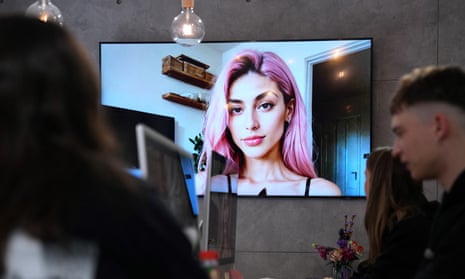Meet Madame Potato. She doesn’t actually exist, but, if things go my way, she’s going to be the world’s first “Miss AI”. I recently created her image on a website that generates AI faces and then entered her into a beauty pageant. Now I am sitting back in anticipation of netting the $20,000 grand prize.
What fresh hell is this, you ask? Well, I regret to inform you that AI beauty pageants are a thing now. A company called Fanvue, which is a subscription-based content creator platform along the same lines as OnlyFans, recently teamed up with the World AI Creator Awards (WAICA) to launch the world’s first “Miss AI” competition. A team of judges – comprising two humans and two virtual models – will sort through AI-generated pictures of women and choose one to crown as “Miss AI”. The winner gets a cash prize along with the chance to monetize their creation on Fanvue.
How are the winners chosen? Looks, obviously. But judges will also look at the size of the character’s followings and their “personalities”. The application includes questions like: “If your AI model could talk, what would be their one dream to make the world a better place?” (Madame Potato’s answer: bring the world together through a shared love of starchy root vegetables.) The technical skills behind the character’s creation will also be taken into account by the judges.
A press release from WAICA notes that the competition “signifies a monumental leap forward – launching almost 200 years after the world’s first ever real life beauty pageant took place in the 1880s”.
Rather than being a “leap forward”, however, it feels like a monumental step backwards. AI models don’t disrupt traditional beauty standards, they exaggerate them. They take every toxic gendered beauty norm and bundle them up into completely unrealistic package.
Just take a look, for example, at the two AI models who are judging the competition: Aitana Lopez and Emily Pellegrini. Pellegrini was designed by an anonymous creator who has said they asked Chat GPT what the average man’s dream girl is, and then designed the model exactly along those lines. Which means: long hair, big breasts, flawless skin and a sculpted body. Pelligrini – who, again, is a purely digital creation – reportedly makes thousands of dollars on Fanvue and has famous footballers sliding into her Instagram DMs because they think she is a real person.
The other judge, Lopez, who is billed as “Spain’s first AI model” and can apparently “earn up to €10,000 a month” doing modeling work for brands, was built along the same lines. Lopez’s creators, who run an AI modeling agency called The Clueless, have shrugged off criticism about her sexualized appearance by arguing that they’re just responding to market forces. “If we don’t follow this aesthetic, brands won’t be interested,” one of the creators told reporters. “To change this system, you have to change the vision of the brands. The world in general is sexualized.”
So is this the future then? Are human models going to be replaced entirely by AI? The folk at The Clueless certainly seem to hope so. “[Brands] want to have an image that is not a real person and that represents their brand values, so that there are no continuity problems if they have to fire someone or can no longer count on them,” founder Rubén Cruz told Euronews. And all that makes sense. Why wouldn’t brands want to use models that never age and that they have total control of?
AI models are not going to take over completely. Some brands, including Dove (which positions itself around “real beauty”) have even pledged not to use AI to represent real people in its advertising. Nevertheless, it seems inevitable that we will see more and more AI-generated influencers in the mainstream. It also seems inevitable that being bombarded with completely unrealistic beauty standards is not going to do much good to young people’s psyches. Kids as young as 10 are already dangerous obsessed with skincare and anti-ageing products because of influencers on TikTok. There’s also been a big rise in people in their 20s getting “preventative Botox” to ward off wrinkles. A proliferation of AI influencers, with their flawless line-free faces, will be an even bigger boon to the plastic surgery and cosmetic industries.
Are the creators of “Miss AI” worried about their potential detrimental impact on beauty standards? Not really. Sally-Ann Fawcett, a beauty pageant historian who is one of the two real-life judges, has told Forbes she expects the competition to be very inclusive. “This isn’t about bums and boobs and fantasy figures,” said the judge. “Creators have a chance to change the public’s perception of AI women and I hope to play a part in that too by selecting a winner representing the modern world.” Which is very reassuring to hear. However, Fawcett may want to ask the Miss AI pageant to update its website. Because, at the moment, it’s all bums, and boobs and fantasy figures.
Arwa Mahdawi is a Guardian US columnist











